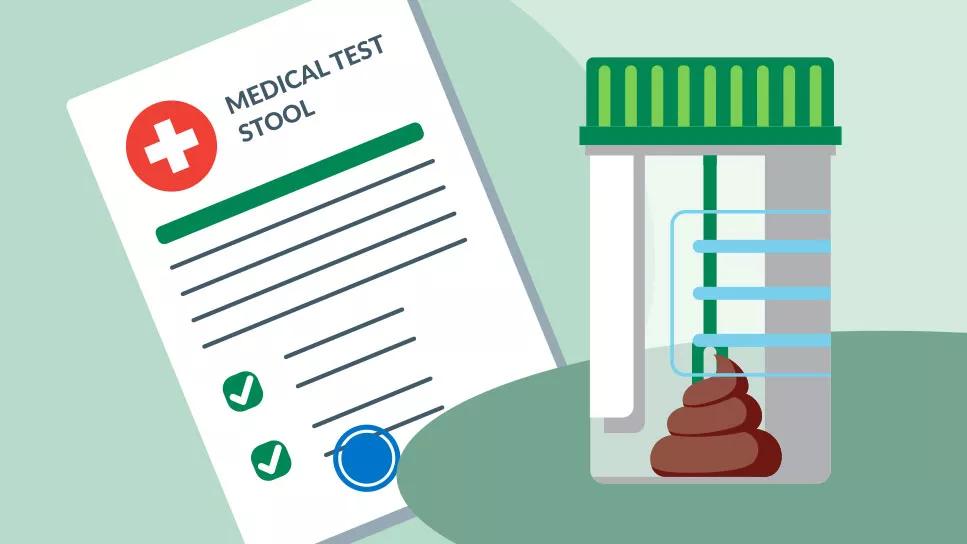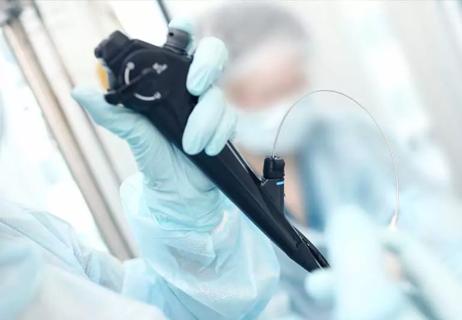At-home screening options can be good detection tools, but a colonoscopy remains the gold standard

Can a colon cancer screening really be as simple as mailing a sample of your poo to a lab for analysis? The answer may be yes — but don’t cancel that colonoscopy just yet.
Advertisement
Cleveland Clinic is a non-profit academic medical center. Advertising on our site helps support our mission. We do not endorse non-Cleveland Clinic products or services. Policy
At-home stool tests can be an effective tool for detecting colon cancer. But the tests aren’t as accurate as a colonoscopy and they offer no way to find and remove polyps that could turn cancerous.
So, are these poop-in-a-box tests worth trying? Colorectal surgeon Arielle Kanters, MD, explains the benefits and shortcomings.
As the name implies, an at-home colon cancer test takes place in the comfort of your home without a doctor present. The test looks for abnormal cells or blood present in a sample of your stool.
To get that sample … well, it’s going to require you to collect your own poop and send it off to a lab for analysis. It’s a hands-on task and not for the squeamish.
Three main stool tests are offered, each with a different focus for folks in the lab.
Advertisement
(Want to know more about each test? Watch as Dr. Kanters explains different colorectal cancer screening options in this video.)
At-home stool tests can be effective at finding colon cancer. Research shows that:
It typically takes about two weeks to get results from an at-home colon cancer test. If the lab flags something as potentially worrisome, don’t panic. False positives are not uncommon with these tests.
Talk to your doctor about what the next steps are in terms of figuring out what’s going on if you get a concerning result.
“If you’re having blood in your poop, your test results are going to be positive and you’re going to need a colonoscopy,” Dr. Kanters explains. “If the test is abnormal, you do still need a colonoscopy to follow up and better understand why.”
Stool tests are an easy, at-home way to check for potential signs of colorectal cancer. They’re also far less invasive, intense and uncomfortable than a colonoscopy.
But it’s important to note the limitations of stool tests compared to a colonoscopy when it comes to detecting anything precancerous — which is a pretty big deal, emphasizes Dr. Kanters.
“Relying on these fecal tests means that you’re potentially missing out on finding an early pre-cancer that could be eliminated and never turn into something scarier,” she says.
Colorectal cancers typically begin as growths called polyps, which form on the inner lining of your colon or rectum. Finding and removing polyps before they become cancerous is the most effective way to prevent colon cancer.
Given that, a colonoscopy remains the gold standard for cancer screening. In one single procedure, it allows for the detection and removal of polyps to help prevent cancer from developing.
“One of the benefits of a colonoscopy is that we can not only treat and identify cancers, but we can treat pre-cancer,” shares Dr. Kanters. “In other words, the pre-cancerous polyps we might find and remove never reach the point of turning into cancer in the first place.”
A colonoscopy also is about 99% accurate in finding colon cancer that has developed.
So, bottom line? “In my mind, a colonoscopy is always the way to go,” recommends Dr. Kanters.
If you’re interested in an at-home stool test for colon cancer, talk to your healthcare provider. “It’s important that you have a conversation and figure out if this is the right test for you,” says Dr. Kanter.
Advertisement
An at-home colon cancer test can be a good choice if having anesthesia or sedation during a colonoscopy puts you at higher risk for complications.
Your health insurance or access to medical care also may make at-home tests a better option.
“With an at-home test, we can at least screen to learn if you’re at risk,” notes Dr. Kanters. "These tests can provide information that can help you seek out additional testing so you know what you’re dealing with.”
But at-home tests aren’t recommended if you have:
“These are all reasons for a full evaluation being performed,” she adds.
If you’re at average risk for colorectal cancer — that is, you have no existing symptoms, family history or risk factors — your first at-home test or colonoscopy should happen at the age of 45, says Dr. Kanters.
Screening for colon cancer is vital because symptoms often don’t appear in the disease’s early and more treatable stages. “It’s the best way to identify issues ahead of any problems,” says Dr. Kanters.
Early detection of colorectal cancer before it has a chance to spread outside the colon or rectum increases your odds of successful treatment, according to the American Cancer Society.
Advertisement
The five-year relative survival rate for colorectal cancer is about 90% when the disease is found early. Here’s the concern, though: Only about 4 of 10 colorectal cancers are detected at this stage.
So, whether you choose to get a colonoscopy or take an at-home stool test, just get one done.
“Ultimately, if an at-home test is what gets you screened for cancer, absolutely do it,” encourages Dr. Kanters. “They’re a great way to determine if something else needs to be done and better understand your risk for possibly having cancer.”
Advertisement
Learn more about our editorial process.
Advertisement

Focus on exercise, eating healthy and getting regular screenings to help lower your risk

Chronic inflammation from flare-ups can damage the lining of your intestinal wall, making your colon more vulnerable to cancer

Colonoscopies and sigmoidoscopies are types of endoscopies, procedures that look at the health of your large intestine

A steady increase in cases in those younger than 50 started decades ago

If you’re at average risk, it’s recommended that you get your first colonoscopy at age 45

It’s a slow-moving process that offers an opportunity for early detection and treatment

Knowing your family history and getting a genetic test can help detect colorectal cancer earlier

Get lots of fiber, cut back on red meat and limit your alcohol intake

Wearing a scarf, adjusting your outdoor activities and following your asthma treatment plan can help limit breathing problems

Your diet in the weeks, days and hours ahead of your race can power you to the finish line

When someone guilt trips you, they’re using emotionally manipulative behavior to try to get you to act a certain way